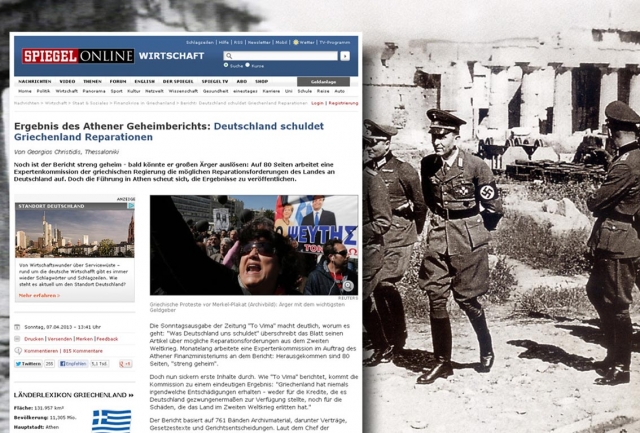The issue of German war reparations has reappeared in the Greek public domain, but at the highest possible level this time. According to a publication in To Vima newspaper, the Ministry of Finance has carried out an investigation of the historical record of reparations. For two and a half months, experts handled the huge archive that consists of court claims of individual persons, contracts, court decisions, legal texts and other documents.
As a result of the research, the Ministry has already submitted an 80-page report to the Prime Minister’s office and the Ministry of Foreign Affairs. It contains data, evidence and legal arguments as regards the reparations that Germany owes Greece.
Antonis Samaras had commissioned the report to Deputy Minister of Finance Christos Staikouras in December 2012. The general director of treasury and budget at the National Audit Office, Panagiotis Karakousis, headed the expert commission that carried out the investigation. On 8 March this year, the report was submitted to the political leadership. So far, its content is strictly confidential and nobody knows how the coalition government will use it.
The same day, the Deputy Minister issued a terse message, stating that he had received the report. With his explicit permission, the head of the expert group Panagiotis Karakousis said that over 190,000 pages had been examined and handled. "The archive was scattered. After the necessary restoration, we arranged the separate documents into folders. Each of them contains between 240-300 documents that are in Excel format to facilitate researchers' access to the data," he said.
From a total of 761 folders, 109 or 14% are documents connected with World War I and 652 or 86% - with World War II.
93% of compensations from the period of World War I are associated with damag caused during the period of Greece’s neutrality whereas 91% of cases during World War II are related to compensations in connection with captivity and death cases.
90% of the documents are claims of individuals. The folders contain claims for compensation of heirs in connection with their relatives’ injury, imprisonment or murder as well as damage inflicted to property, residential or commercial sites. Formal agreements, diplomatic notes and official correspondence between Greece and Germany represent 10% of the documents.
"The analysis of the data reveals that only 55% of the amounts awarded were paid to individuals. The Germans gave 115 million euro in total and the remaining amount, namely 100 million DM, was not paid. Presidential Decree 4781, signed in 1961, regulated the compensations to individuals. It ratified the agreement between Greece and Germany on the compensations to individuals who had been harmed by Nazi persecution," said the head of the expert group.
According to the publication, unlike individuals, the Greek state was never interested in seeking reparations from Germany, despite the enormous damage that had been inflicted on the country's infrastructure: buildings, bridges, roads, ports, ships and hospitals. In comparison, the publication gives the examples of France, Britain, Poland and Yugoslavia, which received reparations from Germany based on the London Agreement of 1953. Under it, Germany had to repay its foreign obligations only if it was united again. The article points out that this fact dates back to 3 October 1990.

collage: ethnos.gr
At the same time, according to the official records of the Bank of Greece, the payments to Germany during the occupation amounted to 1,617,781,093,648,819 drachmas and to Italy – 220, 479,188,480 drachmas.
After the elimination of costs under the law, which was in force at the time, Germany received in the form of an advance payment the amount of 1,530,033,302,528,819 drachmas and Italy – 157,053,637,000 drachmas.
These are the so-called occupation loans and under the agreements of March and December 1942, they had to be repaid after the end of the war. According to the calculations made by the Bank of Greece immediately after the cessation of hostilities, the total amount was 4.5 million gold pounds sterling. Even then, Greek scholars were of the opinion that the calculation of the occupation loan on the basis of British currency was not correct and insisted that it should be calculated in dollars. This debate continues today.
Under the London Agreement, war reparations are not subject to statute of limitations. According to legal experts, there is undisputable evidence as regards the money that the Bank of Greece was obliged to pay the occupiers - Germany and Italy - from 1942 to 1945:
1. The money was paid each month (3.5 billion "occupation" drachmas), so the loan is recognized by Germany not only de jure, but also de facto.
2. There are contributions that the invaders did not withdraw completely.
3. There are months in which the invaders returned part of the loan instalments.
The researchers’ conclusion is that Greece did not receive any reparations for occupation loans or for the damage it suffered during the war.
So far, it is not clear how the Greek government will use the results of the investigation.
The data published by the Greek newspaper have provoked the interest of the German magazine Der Spiegel. The author of the publication writes that according to different sources, Germany’s obligations to Greece amount to 108 billion euro for destroyed infrastructure and 54 billion euro for the forced occupation loan. "The total amount of 162 billion euro is equivalent to 80% of today's GDP of Greece and if it receives the money, it will cover a large part of the public debt of the country. Germany’s government argues that such claims are unfounded and the Greek one "puts on the brake" and considers the issue "explosive", because it could complicate its relations with the main lender of Europe," writes the author of the article in Der Spiegel.